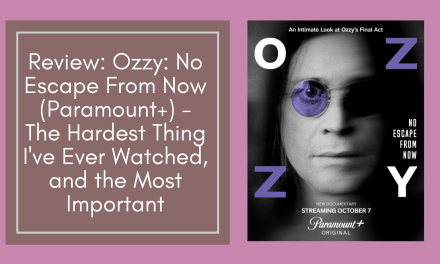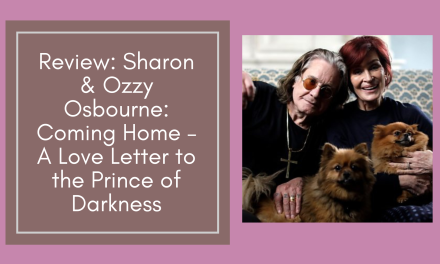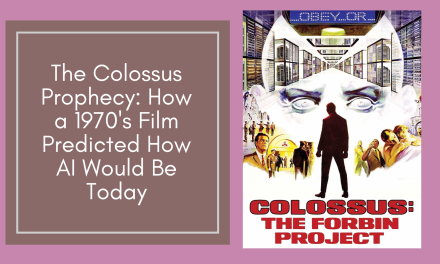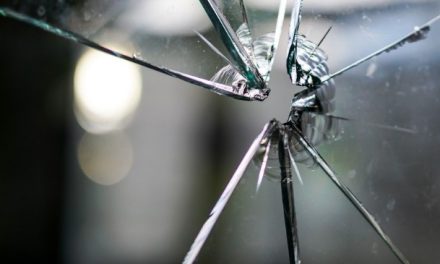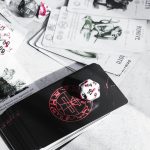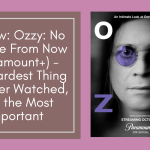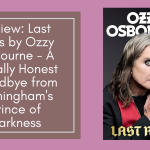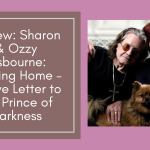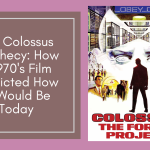I’m writing this with mascara streaked down my face, a box of tissues beside me and I’ve been sobbing for the best part of two hours. I’ve just finished watching Ozzy: No Escape From Now on Paramount+, and I’m absolutely wrecked. Properly, utterly broken. But I’m also grateful beyond words that this documentary exists.
If you’re an Ozzy fan like me, and I mean a proper, lifelong, diehard fan who’s been listening to him since you were 5 years old like I have, then you need to watch this. But I’m warning you now: get the tissues ready. Get a whole bloody box of them. Hell, get two. Because you’re going to need them.
This Was Never Meant to be Ozzy’s Goodbye….
The first thing you need to know about No Escape From Now is that it wasn’t supposed to be a posthumous documentary. Director Tania Alexander (a BAFTA winner, and bloody brilliant she is too) started filming in 2019, following Ozzy through what was meant to be his recovery from a fall and his journey back to the stage. The plan was to capture his resilience, his comeback, his final triumph.
Instead, what we got was something far rawer and heartbreaking: a two-hour chronicle of Ozzy’s final six years, documenting his decline, his pain, his depression, and ultimately his extraordinary determination to say goodbye to his fans properly at Villa Park on 5 July 2025. Ozzy passed away on 22 July – just 17 days later – while the film was still being edited.
That knowledge sits heavy throughout the entire documentary. You’re watching a man fight tooth and nail to survive, to perform one more time, knowing that he doesn’t make it much longer past that final show. It’s utterly devastating.
The Fall That Changed Everything
The documentary opens with the events of February 2019, when Ozzy was on his “No More Tours II” farewell tour. He’d already been hospitalised with staph infections on his neck and thumb, and while recovering at home, he fell in the middle of the night trying to get to the bathroom.
Here’s where it gets absolutely infuriating: the first hospital sent him home, saying he was just bruised. BRUISED! It wasn’t until the next day, when he couldn’t move his arms, that a proper MRI at a different hospital revealed he’d broken his neck. As Kelly Osbourne says in the doc, “It’s insane to me they let him out of the first hospital.”
But that’s just the beginning of Ozzy’s medical nightmare. What follows is a cascade of surgeries, complications, and what his son Jack describes as a botched spinal surgery that “stripped him of his abilities to move.” Watching Jack talk about this makes me so angry I want to scream. He’s absolutely right when he says, “all of this could have been avoided. It didn’t have to happen.”
As someone who’s had my own battles with the medical system, who lives with complex PTSD and multiple diagnoses that took years to get properly recognised, this hit me HARD. The medical establishment failed Ozzy Osbourne, one of the most famous rock stars on the planet. If they can fail him, they can fail anyone. And they do. Every single day.
Watching Your Hero Suffer Is Pure Torture
I’m not going to lie to you – there are parts of this documentary that are almost unbearable to watch. Seeing Ozzy, the Prince of Darkness, the man who allegedly bit the head off a bat, the legend who survived decades of drug and alcohol abuse, seeing him hunched over in pain, barely able to move, talking about wanting to end it all – it’s soul-destroying.
There’s a moment in April 2025, just 72 days before the Villa Park show, where Ozzy sits in his backyard and weeps, convinced he won’t make it to Birmingham. He’s dealing with a cracked vertebrae on top of everything else, he’s weak from sepsis, and he’s in constant, unrelenting pain. Sharon’s sat beside him with tears streaming down her face, and Ozzy says in this raspy, broken voice: “It’s fucking soul-destroying. I’ve got to be there. I have to be there.”
I had to pause the documentary at that point because I was crying so hard, I couldn’t see the screen. The thought that just two months later, he DID make it to that stage, that he DID perform for us, his fans – that’s not just determination, that’s love. Pure, unfiltered love for his fans.
Sharon: The Unsung Hero
If there’s one thing this documentary makes crystal clear, it’s that Sharon Osbourne is an absolute warrior. She’s not just Ozzy’s wife and manager, she’s his cheerleader, his nurse, his therapist, his advocate, and the reason he kept fighting when everything in him wanted to give up.
The documentary shows Sharon at her rawest: exhausted, scared, sometimes overwhelmed, but never giving up on Ozzy. She says at one point, “I know Ozzy’s a drama queen. He’ll do anything for a pain pill. But this was for real.” Watching her navigate the impossible task of keeping Ozzy’s spirits up while managing his deteriorating health and trying to fulfil his final wish to perform, it’s heartbreaking and inspiring in equal measure.
Sharon, if you ever read this: you are incredible. Ozzy was lucky to have you, and we all saw how much you loved him. Thank you for sharing these painful, intimate moments with us. I know it can’t have been easy.
Music Was Ozzy’s Medicine
One of the few bright spots in the documentary – and thank God for them, because without these moments I don’t think I could have made it through – is watching Ozzy in the recording studio. When he’s making music, something shifts. The pain recedes (even if just temporarily), the depression lifts, and you see glimpses of the old Ozzy.
The footage of him working with producer Andrew Watt on Patient Number 9 is genuinely joyful. Ozzy’s sat in a chair (he can’t stand for long anymore), but he’s workshopping lyrics, recording vocals, laughing with the musicians. Chad Smith, Robert Trujillo, Zakk Wylde – they’re all there, and you can see the reverence and love they have for him. As Ozzy says himself, “It got me out of the blues. That was the best medicine I ever had at that point.”
The collaboration with Post Malone on “Take What You Want” was particularly important. It reignited something in Ozzy, reminded him that he could still create, still contribute. Watching him light up in those studio sessions made me cry again, but this time with happiness. Music literally kept him alive.
The Rock Hall Induction: Bittersweet Triumph
The section covering Ozzy’s 2024 Rock and Roll Hall of Fame induction is both triumphant and absolutely gutting. He was eligible for induction over 20 years earlier, and they finally, FINALLY honoured him when he was too ill to perform himself.
Ozzy had to watch from the side of the stage as an all-star band including Billy Idol, Maynard James Keenan, Chad Smith, Robert Trujillo, Wolfgang Van Halen and loads of others performed his songs in tribute. The documentary captures Ozzy watching with tears in his eyes, and he says: “I just welled up in my fucking throat because I was feeling sorry for myself at the same time that I couldn’t get up there to do the thing myself. It was a bittersweet thing, the whole thing. A big part of my heart was getting broken because I belong up there, you know?”
Reading those words in Last Rites was one thing. SEEING it, watching his face as he says it, I really lost it. That moment encapsulates everything heartbreaking about Ozzy’s final years: he was still all there mentally, still desperate to perform, but his body had betrayed him.
The Villa Park Journey: Against All Odds
The final third of the documentary focuses on the build-up to the “Back to the Beginning” concert at Villa Park on 5 July 2025, and it’s absolutely gripping. For months, it genuinely looks like Ozzy won’t make it. His health keeps deteriorating, he’s in constant pain, and Sharon openly admits she doesn’t think he can do it.
But Ozzy being Ozzy – stubborn, determined, and utterly devoted to his fans – doubles down on physical therapy and refuses to give up. The behind-the-scenes footage of him preparing is both inspiring and harrowing. You see him working with trainers, pushing through agony, and somehow, miraculously, getting strong enough to make the journey to Birmingham.
I watched that concert livestreamed from my sofa on 5 July. I wrote about it extensively on my blog. But seeing the backstage footage, understanding just how close Ozzy came to not making it, makes that performance even more extraordinary than I already thought it was. And trust me, I already thought it was one of the most important concerts in rock history.
There’s this moment captured on film where Ozzy is about to go on stage. He looks defeated, exhausted, like a man at the end of his strength. Then, seconds before he comes into view of the audience, he breaks into that trademark Ozzy grin. It’s forced at first, but you can see it become real as he hears the crowd. That transformation – from a frail, suffering man to the Prince of Darkness one more time – absolutely destroyed me.
The Funeral Footage: A Final Goodbye
Right at the end, the documentary includes a brief shot of Ozzy’s funeral cortege travelling through Birmingham on 30 July 2025. It cuts to it so abruptly that it feels like a punch to the gut, which I suppose is the point. One moment he’s triumphant on stage at Villa Park, the next he’s gone.
I watched that funeral procession live on television from my home in Worcester. I wrote about it. But seeing it again in this context, as the final moments of the documentary, absolutely wrecked me all over again. The purple “Ozzy” floral tribute on his coffin, Sharon trembling as she got out of the car at the Black Sabbath bridge, the brass band playing “Iron Man” – it’s Birmingham saying goodbye to its favourite son.
Why This Documentary Matters (Even Though It’s Brutal)
Look, I’m not going to pretend this is an easy watch. It’s not. There were times I genuinely considered turning it off because it was too painful. Watching your hero suffer, seeing him contemplate ending his life, witnessing his body fail him repeatedly – it was excruciating.
But here’s why it matters: No Escape From Now shows us the REAL Ozzy Osbourne. Not the character from The Osbournes. Not the bat-biting madman. Not the sanitised rock legend. It shows us John Michael Osbourne from Aston in Birmingham, a working-class lad who became a global icon, who suffered immensely in his final years, who battled depression and chronic pain, and who STILL found the strength to get on that stage one more time for his fans.
This documentary is about resilience. It’s about the power of music. It’s about family. It’s about what it means to be human when your body is failing you. And as someone who lives with autism, ADHD, dyspraxia, dyscalculia, and complex PTSD – as someone who knows what it’s like when your body and brain don’t cooperate – this documentary spoke to me on a level I didn’t expect.
Ozzy didn’t give up. Even when everything seemed impossible, even when the pain was unbearable, even when he wanted to end it all, he kept fighting. And not for himself – for US. For his fans. Because he loved us and wanted to say goodbye properly.
The Revelations That Broke My Heart
The documentary contains several revelations that are absolutely devastating. Kelly Osbourne reveals that her dad “will never get over being fired from Black Sabbath. He’ll never get over that, ever ever ever. It hurt him more than anything people can put into words. It destroyed him.”
Hearing that made so much sense. That’s why the Villa Park reunion was so important to him. That’s why he HAD to make it to Birmingham. It was about redemption, about proving he could still do it, about getting closure with his Black Sabbath brothers. And thank God he got that moment, because less than three weeks later he was gone.
The documentary also includes interviews with rock legends like James Hetfield, Tony Iommi, Billy Idol, Zakk Wylde, Tom Morello, and so many others. Watching these massive stars, artists who’ve sold millions of records themselves, get emotional talking about what Ozzy meant to them is incredibly powerful. Billy Corgan got properly upset. James Hetfield reflected on how Ozzy was “cutting the path” for the rest of them, showing them how to end a legendary career with dignity.
And they were right. That’s exactly what Ozzy did. He showed us how to face mortality with courage, humour, and grace.
My Verdict: Essential Viewing (But Have Tissues Ready)
Ozzy: No Escape From Now is without question the most difficult documentary I’ve ever watched. It’s raw, unflinching, and at times almost unbearably sad. But it’s also essential viewing for any Ozzy Osbourne or Black Sabbath fan.
Tania Alexander has created something remarkable here: a brutally honest portrait of a legend in decline that somehow manages to be both heartbreaking and life-affirming. It doesn’t shy away from the ugly truths, the medical failures, the depression, the chronic pain, the moments where Ozzy wanted to give up. But it also celebrates his resilience, his humour, his love for his family, and his unwavering devotion to his fans.
This documentary is Ozzy’s truth. It’s Sharon’s truth. It’s their family’s truth. And they’ve shared it with us, the fans, as a final gift. It’s the companion piece to Ozzy’s book Last Rites, and together they give us the full picture of Ozzy’s final chapter.
Yes, it’s hard to watch. Yes, you’ll cry. Yes, there are moments that will make you angry at the medical system, at the Rock Hall for waiting so long, at the universe for allowing this to happen to someone so beloved. But you’ll also laugh (Ozzy’s sense of humour remains intact throughout), you’ll be inspired, and you’ll finish it with even more love and respect for the Prince of Darkness than you had before.
Two hours of runtime fly by. If anything, I wish it was longer. But as one IMDB reviewer said, “that would mean me crying a lot more.”
A Personal Note
I’ve loved Ozzy Osbourne since I was 5 years old. He’s been the soundtrack to my life through every up and down. As someone who’s openly neurodivergent, who’s faced my own struggles with mental health and physical challenges, who lost my beloved son Frankie in 2013, I’ve always connected with Ozzy’s authenticity, his vulnerability, and his refusal to pretend everything was okay when it wasn’t.
Watching this documentary reminded me why he’s been my hero for all these years. Not because he was perfect – he never claimed to be. But because he was REAL. Because he kept fighting. Because even in his darkest moments, he found reasons to keep going. And because when it mattered most, he showed up for his fans.
That Villa Park performance will go down in history as one of the greatest final acts in rock music. I never thought that I would see another live music performance in my lifetime that was up there with Freddie Mercury and Queen’s iconic performance at Live Aid on 13 July 1985. But I have thanks to Ozzy and Black Sabbath’s Villa Park performances, and this documentary ensures we’ll never forget what it cost him to give us that moment. It’s a love letter from Ozzy to his fans, and from his fans back to him.
Thank you, Tania Alexander, for telling this story with such honesty and compassion. Thank you, Sharon, Kelly, Jack, and Aimee, for letting us into your private grief and showing us these intimate moments. And thank you, Ozzy, for everything. For the music, for the memories, for showing us how to live loud and die with dignity.
You fought until the very end, and you went out exactly as you should have, on stage, in Birmingham, surrounded by the people and city you loved. The Prince of Darkness left us in the light, and we’re all better for having known you.
Rating: 10/10 – Essential, heartbreaking, and ultimately life-affirming. A fitting tribute to a legend.
Note: This review contains spoilers, but honestly, we all know how the story ends. The documentary isn’t about the destination; it’s about the journey. And what a journey it was.

